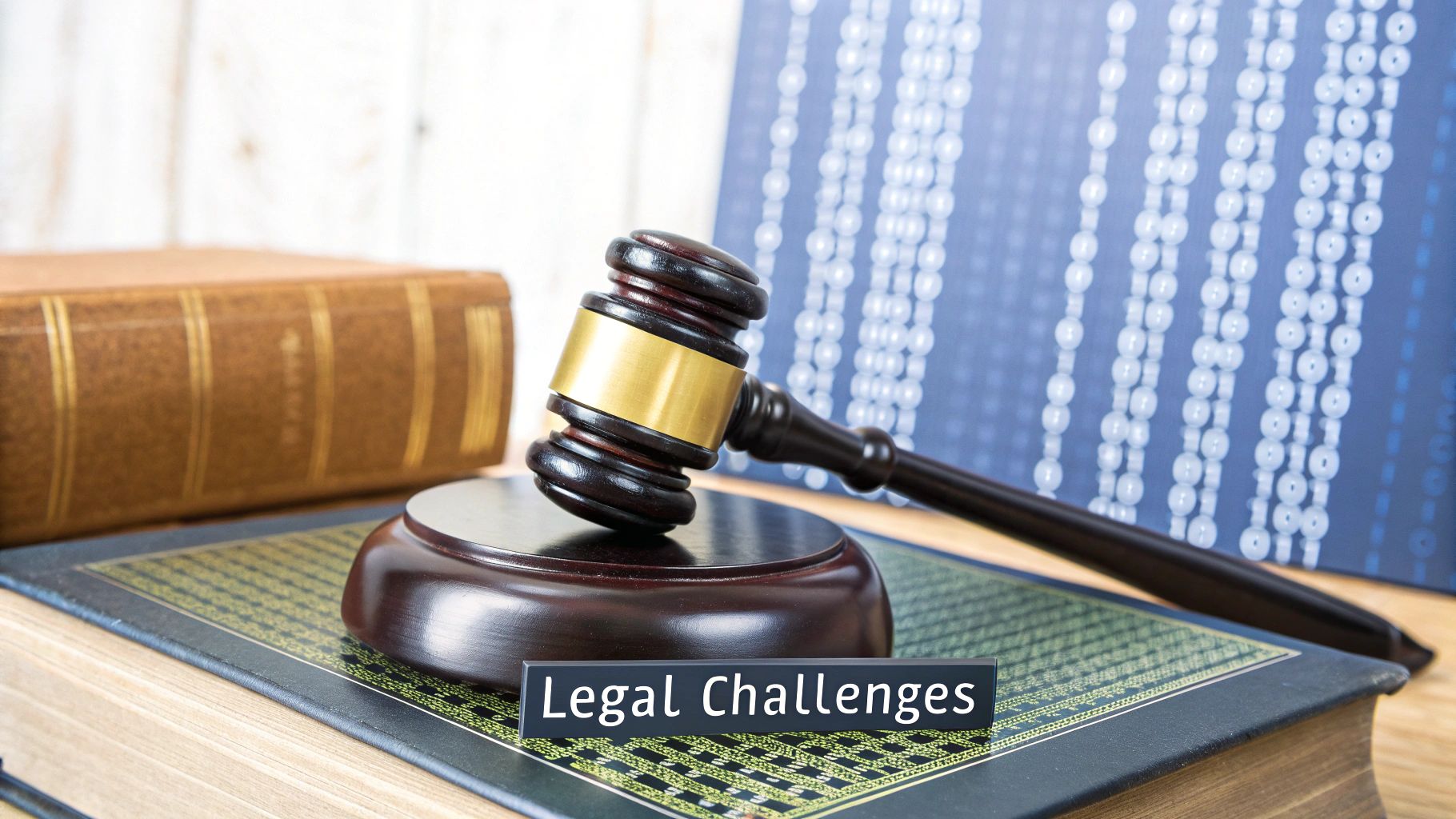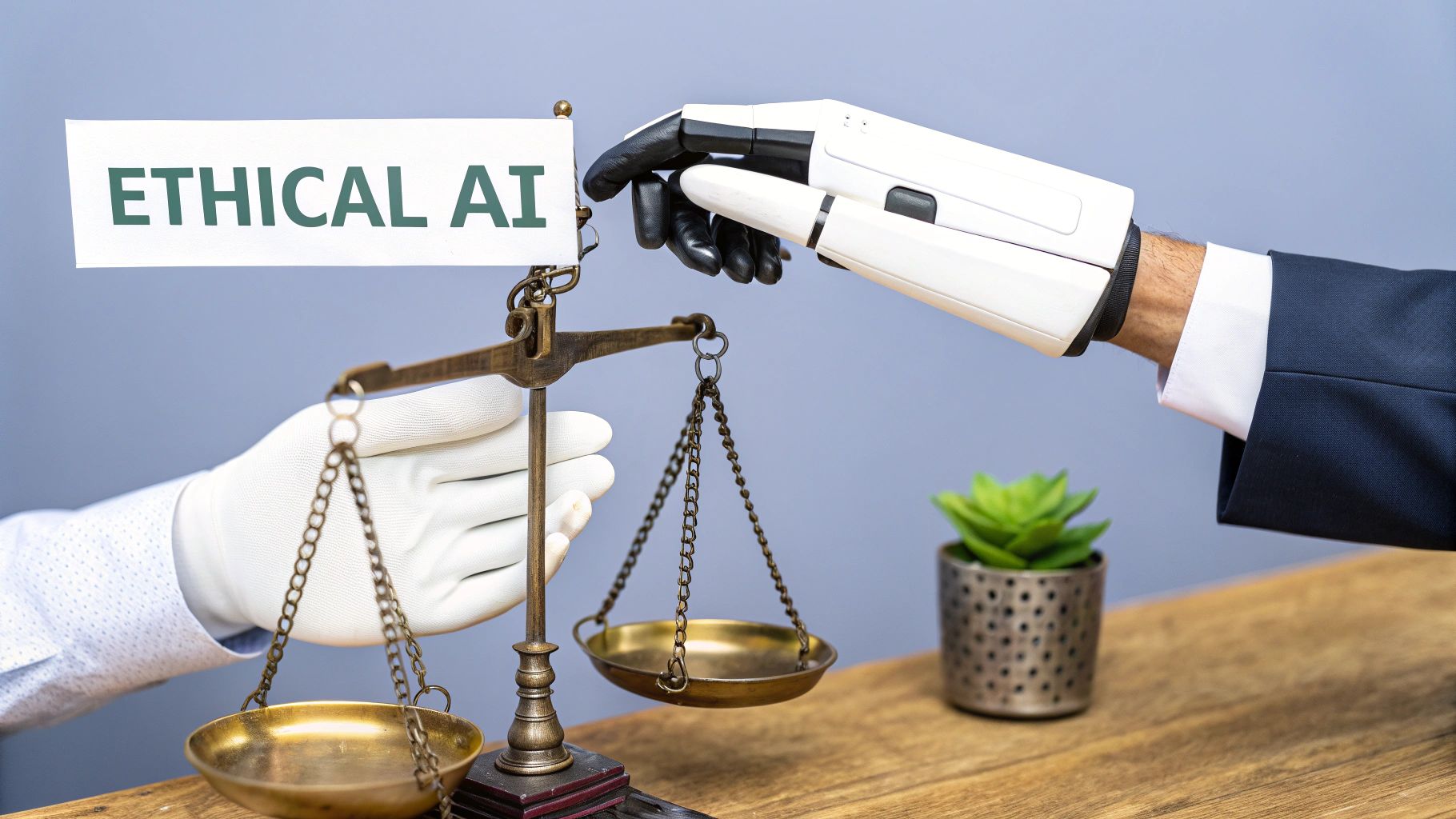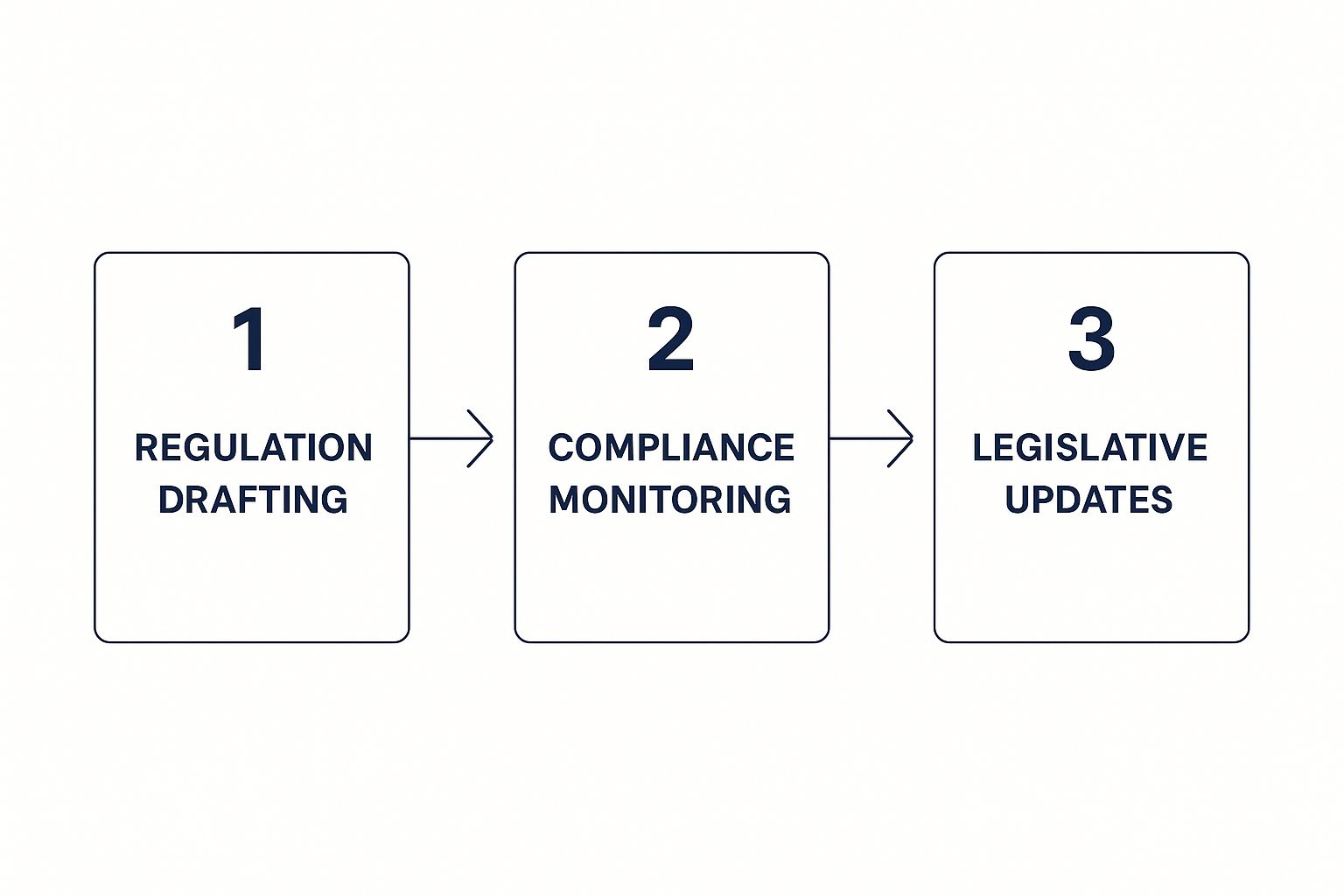The Real State of Law and Artificial Intelligence Today

Everyone's talking about AI and law these days. It's become the latest buzzword, echoing through legal tech conferences. But beyond the hype, what's the reality of AI's impact on the legal field? The truth is, it's a mixed bag. Small firms are effectively using document review tools to save time and money, while some large firms invest millions in AI systems that partners hesitate to use.
For a broader perspective on this evolving intersection, explore how Law and AI are reshaping legal practice.
AI's Actual Impact (Not The Hype)
AI isn't magic; it's a tool. Think of it as a highly sophisticated hammer: powerful but requiring skillful handling. Certain legal areas are experiencing significant benefits from AI implementation.
- Contract Analysis: AI excels at uncovering hidden clauses within lengthy agreements, offering a crucial advantage for time-strapped lawyers.
- Due Diligence: Instead of relying solely on teams of paralegals to sift through mountains of documents, AI can often accomplish this task more quickly and accurately.
- Legal Research: This area presents exciting opportunities and complex challenges, pushing the boundaries of how legal professionals approach research.
This integration of AI isn't a futuristic fantasy; it's happening now. The use of artificial intelligence in legal services is growing rapidly, with increased efficiency as a primary goal. Lawyers are utilizing AI for diverse tasks, from examining case law to drafting contracts. Studies indicate nearly three-quarters of lawyers anticipate incorporating generative AI into their work. However, AI also presents challenges, including instances of "hallucinating" or fabricating facts. This raises important ethical considerations. Discover more insights about this issue
The Messy Truth About AI Adoption
Despite its potential, AI adoption in the legal field is complex. We're in the early stages of implementation, akin to the era of dial-up internet. There's considerable hype, ongoing experimentation, and, unfortunately, some wasted investment.
- Some firms understand how to leverage AI. They choose the right tools, provide proper training, and see a real return on investment.
- Others struggle with implementation. They invest in the most advanced AI systems but fail to integrate them effectively, leading to underutilization. This is more common than you might think.
The Future of Lawyering (And AI)
AI is undeniably transforming the practice of law. This isn't about robots replacing lawyers; it's about lawyers who use AI gaining a significant edge. AI functions as a tireless research assistant, a meticulous contract reviewer, and, at times, an unpredictable legal scholar, all in one.
The crucial question is: how will you adapt to this changing landscape?
Legal AI Tools That Actually Deliver (And Those That Don't)

Let's be honest, the legal tech world is buzzing with the term "AI-powered." Many companies are promoting their products as revolutionary, but the reality often falls short. After spending considerable time and money demoing these platforms, I've found that many are disappointing.
Actual Useful Stuff (For Once)
Artificial intelligence can be incredibly helpful in the legal field. I've personally seen success using AI contract analysis tools to find errors in complex commercial lease agreements. These agreements are known for their intricate and often obscure terms. Litigation analytics tools have also proven valuable in assessing the potential outcome of a case before trial.
While no software can perfectly predict a judge's decision, these tools offer valuable insights. Good legal research platforms, like LexisNexis or Westlaw, are indispensable. They've helped me uncover precedents buried deep within case law, acting like a super-powered research assistant. These tools not only save time but also enhance the quality of work at Cordero Law.
Things That Don't Work (Rant Incoming)
Unfortunately, not all AI legal tools live up to the hype. I've encountered numerous vendors promising groundbreaking solutions, only to discover clunky, inaccurate, or impractical software. One e-discovery platform consistently flagged irrelevant documents while missing crucial evidence. This kind of experience can be incredibly frustrating.
Why AI Implementation Is So Messy (And How To Fix It)
Integrating AI into law firms can be challenging. Many experienced partners may resist adopting new technology. There are also learning curves and substantial costs to consider. Some platforms are incredibly expensive. For AI to genuinely benefit your practice, you must address these challenges directly.
- Select relevant tools: Choose tools that specifically address your practice areas.
- Get buy-in: Ensure everyone, from junior associates to senior partners, is on board.
Check out all Cordero Law posts for more insights. While implementing AI effectively can be difficult, it's undoubtedly worthwhile.
The Future of Law and Artificial Intelligence
Law and artificial intelligence are undeniably becoming interconnected. AI will reshape the legal profession, whether we embrace it or not. The question isn't if but when and how. AI can automate tasks and provide insights previously impossible to obtain.
This transformation isn't a distant future; it's happening now. This presents both exciting opportunities and some apprehension. I believe AI will free up lawyers to focus on the human elements of law, such as strategy, client relationships, and legal arguments.
To help navigate this changing landscape, I've compiled a comparison of some popular AI legal tools:
To help navigate the evolving legal tech landscape, I've compiled a comparison of some popular AI legal tools:
AI Legal Tools Comparison
Comparison of popular AI legal tools based on functionality, accuracy, and practical value.
| Tool Category | Common Applications | Reliability Score | Time Savings | Learning Curve |
|---|---|---|---|---|
| Litigation Analytics | Predicting case outcomes, assessing judge behavior | Medium | High | Medium |
| Contract Analysis | Identifying errors, comparing clauses | High | High | Low |
| Legal Research | Finding relevant precedents, analyzing case law | High | Medium | Low |
This table provides a general overview of the current AI legal tools available. It is important to conduct your own research to select the tool that best suits your individual needs. More to come on all this later.
Navigating the Ethical Minefield of AI in Law

The ethical implications of using AI in law aren't just theoretical; they're practical challenges faced daily. When an associate presents a brief filled with AI-generated research, how can we be certain the citations are accurate? They aren't always, unfortunately.
And what about the critical issue of client confidentiality? Uploading sensitive client documents to a third-party AI platform raises serious concerns. I've witnessed colleagues make regrettable errors, from citing hallucinated case law to accidentally exposing client data. These are real risks.
Verifying AI-Generated Content: Seriously, Check It
AI can fabricate convincing citations that lead nowhere. Thorough verification is paramount. Treat AI like a promising but occasionally unreliable intern. Double-check everything.
- Manual Review: It's old-fashioned, but sometimes essential. Especially for critical arguments, review the cases yourself.
- Cross-Referencing: Utilize multiple sources, including reliable databases like Westlaw and LexisNexis. Don't solely rely on AI-generated results.
- Common Sense Test: If a finding seems too good to be true, it probably is. Be highly skeptical of groundbreaking cases that no human has ever cited.
Confidentiality Concerns: Don't Spill the Secrets
Client confidentiality is non-negotiable. Ethical rules bind us, regardless of AI usage. Think carefully, very carefully, before uploading sensitive information to any third-party platform.
Examine the platform's data security practices, server locations, and access protocols. Who has access to the data, and is that access truly necessary? You are responsible for your client's data, even when processed by algorithms.
Practical Frameworks for Ethical AI Use in Law (Because the Bar Is Behind)
The legal profession is still catching up with AI ethics. The rules are unclear, the guidance vague. But this doesn't absolve us of responsibility. Here are some hard-earned lessons:
- Transparency: Be open with clients about your AI usage. Explain the benefits and limitations, and obtain their informed consent. Informed consent is crucial.
- Oversight: Supervise AI's work, review its output, and ensure alignment with your professional judgment. You are the lawyer, not the algorithm.
- Continuing Education: AI and its ethical implications rapidly evolve. Stay informed on best practices, attend webinars, and consult with colleagues.
Speaking of staying informed, you might find our sitemap useful. It’s surprisingly helpful.
In 2024, AI regulation surged. The IMF noted that up to 40% of all jobs could be impacted by AI, including legal professions. There was even a case involving a lawyer submitting fabricated AI-generated citations. Learn more about AI's impact on the legal profession. Apparently, 96% of lawyers oppose AI representing clients in court. Where would you even file the pro hac vice motion for a robot?
Rapid Fire Thoughts (Because This Section is Running Long, and I'm Out of Time)
AI ethics are complex, ever-changing, and incredibly important. Don't be the lawyer sanctioned for trusting an algorithm too much.
AI Implementation: What Law Firm Vendors Won't Tell You

This infographic illustrates how AI can assist with various legal tasks, from drafting regulations to monitoring compliance and staying updated on legislative changes. The core benefit? AI empowers lawyers to stay ahead. However, implementing AI can be deceptively challenging. Vendors often portray it as a simple plug-and-play solution, but having personally led AI implementation at my previous firm, I can assure you, it's rarely that smooth. Expect unforeseen roadblocks.
Stuff Nobody Tells You (Until It’s Too Late)
One major hurdle is resistance from senior partners. Many have practiced law the same way for decades, pre-dating the widespread adoption of the internet. Convincing them to embrace new technology can be an uphill battle. Then, there are the hidden costs. Those glossy brochures conveniently omit the significant training fees, ongoing software updates, and inevitable IT issues. The actual cost extends far beyond the initial price tag. Finding associates proficient in using the technology adds another layer of complexity.
And let's not forget training. Some attorneys struggle with email, let alone complex AI tools. It can feel like handing a toddler the keys to a Formula 1 race car.
Choosing the Right Tools (Not Just The Flashy Ones)
Don't be swayed by dazzling demos. AI that composes haikus might be impressive, but it's impractical if your firm specializes in commercial real estate. Prioritize tools that address your firm's specific needs. Do you require improved contract review? Faster legal research? Or more cost-effective e-discovery? Some platforms charge exorbitant fees. Determine your firm’s needs first, then evaluate available options. Ethical considerations are also paramount when integrating AI in law, as discussed in the ShyEditor's AI Policy.
Getting Buy-In (aka Herding Cats)
Successful AI implementation isn't solely about technology; it's about people. You need buy-in from everyone, from the managing partner to the newest paralegal. Start with a small-scale pilot project, demonstrate tangible benefits quickly, and acknowledge successes. Explain AI in plain English, avoiding technical jargon. Emphasize how AI can free up time for attorneys to focus on higher-value tasks, like winning cases. Let's be honest, nobody enjoys reviewing hundreds of pages of documents. AI can make that process less tedious.
Measuring ROI (aka Proving Your Sanity)
Return on Investment (ROI) isn't just about billable hours (though that's what partners often prioritize). It also encompasses risk management, client satisfaction, and even lawyer well-being. Meticulously track everything – time saved, errors avoided, cases won – and present this data clearly and concisely. Data is crucial. Clear charts, accessible even to non-technical individuals, are invaluable. Lawyers appreciate data-driven insights.
To help visualize the implementation process, the following table outlines key phases, timelines, challenges, and success indicators:
AI Implementation Phases
Timeline and key considerations for each phase of implementing AI in a law practice
| Implementation Phase | Timeline | Key Challenges | Success Indicators | Common Pitfalls |
|---|---|---|---|---|
| Initial Assessment | 1-2 months | Identifying firm needs and suitable AI tools | Clear understanding of requirements and potential AI applications | Focusing on flashy features instead of practical needs |
| Pilot Project | 2-3 months | Securing buy-in and managing initial training | Measurable improvements in efficiency or accuracy in a specific area | Lack of clear metrics for evaluation |
| Firm-Wide Rollout | 6-12 months | Scaling the solution and addressing user adoption | Widespread use of AI tools and positive feedback from staff | Inadequate training and support |
| Ongoing Optimization | Continuous | Monitoring performance and adapting to evolving needs | Continuous improvement in ROI and user satisfaction | Failing to adapt to changing legal and technological landscape |
This table provides a roadmap for a successful AI implementation. By addressing the key challenges and focusing on the success indicators, law firms can maximize the benefits of AI. Remember, careful planning and ongoing evaluation are essential for long-term success.
Client Expectations in the Age of AI Legal Solutions
Here's the uncomfortable truth: clients are starting to ask why they're paying top dollar, sometimes upwards of $450/hour, for work that ChatGPT could theoretically do for free. Look, I get it. I've been on both sides of this conversation (as a lawyer and a client), and it can get awkward fast.
"But ChatGPT is Free!" (Navigating the Pricing Conversation)
Clients, especially younger, tech-savvy ones, are increasingly aware of AI's capabilities. They might not understand the nuances of legal practice, but they see ChatGPT churning out decent-looking contracts and think, "Why am I paying a lawyer thousands for this?"
This isn't always a fair comparison, of course. ChatGPT hallucinates cases and misses crucial legal subtleties. But it's the perception we're dealing with.
So, how do you address this? Sometimes brutal honesty works best. I've had conversations where I straight-up acknowledged, "Yeah, AI can draft a basic contract, but it can't negotiate one, understand your specific business goals, or anticipate potential legal pitfalls." You might be interested in: Cordero Law Group's sitemap for more information on our services.
Selling Your Value (Beyond Automation)
This forces us to articulate our value proposition more clearly. It's not just about what we do, but what we bring to the table:
- Judgment
- Experience
- Strategic Thinking
- The ability to navigate complex legal and business situations
AI can handle the rote tasks, but it can't replace the human element of lawyering – the part where we actually think.
The Pricing Elephant in the Room (AI and Fees)
The billable hour is under pressure. Clients are starting to balk at paying premium prices for tasks that can be partly or fully automated. This means firms have to be more creative with their pricing. Here are a few options:
AI-Assisted Fixed Fees: For routine tasks like document review or basic contract drafting, fixed fees make more sense. AI allows us to complete these tasks more efficiently, and we can pass those cost savings onto the client.
Hybrid Billing: This might involve combining fixed fees for AI-driven tasks with hourly billing for more complex, strategy-focused work.
Value-Based Pricing: This shifts the conversation from how long something takes to what it's worth. If we can demonstrate that our expertise delivers significant value, the price becomes less of an issue.
The legal profession is changing, and client expectations are changing with it. If we don't adapt to this new reality – and I'm talking real-world adjustments – we risk being left behind. This isn't theoretical anymore; this is client retention and profit margins. And those things affect lawyers every single day. This is a business, and we have to run it that way.
The Future Legal Landscape: How Attorneys Will Work With AI
AI is changing the legal field. This isn't about robots replacing judges (though, let’s be honest, sometimes a robot judge sounds tempting). Instead, the real change is about collaboration: AI and attorneys working together, each playing to their strengths.
AI: Your Superpowered Paralegal (But Not Your Replacement)
Imagine AI as the ultimate research assistant. It can analyze mountains of case law faster than any human, uncovering obscure precedents that can win or lose a case. Contract review? Instead of spending hours deciphering legalese, AI can highlight inconsistencies and potential problems in minutes. This allows attorneys to focus on strategy: developing arguments, advising clients, and negotiating deals – tasks AI can't handle (yet).
Stubbornly Human Skills (For Now…)
Some skills remain uniquely human. Negotiation, for example. That intricate dance of give-and-take requires reading body language and understanding unspoken motivations. Similarly, client counseling demands empathy, explaining complex legal issues clearly, and building trust. These skills are still firmly in human hands.
The future of law does involve technology. It involves clients understanding your value beyond what free AI tools can provide. It's less about asking, "find me a precedent," and more about, "tell me how this precedent applies to my situation." It's about using AI to your advantage, not being controlled by it. At Cordero Law, we focus on that personal connection algorithms can’t replicate.
New Legal Roles? Seriously?
Yes, seriously. The legal industry is evolving. New roles will emerge, like AI ethics specialists – attorneys who understand the legal and ethical implications of using AI in practice. Or legal technologists – professionals bridging the gap between law and technology, helping firms implement and manage AI systems effectively. These roles will be vital for firms and clients adapting to the changing landscape.
Let’s Get Real About AI Adoption
Change can be daunting, especially in a tradition-bound profession. Many lawyers resist AI, saying, "It'll never replace human judgment." They're right. But AI isn't meant to replace judgment; it’s designed to enhance it.
AI handles tedious tasks, freeing you to focus on higher-level thinking that requires your expertise. AI identifies potential contract issues; you analyze the implications and decide on the best course of action. AI and lawyers will coexist. In fact, it’s safe to assume they’ll work together.
What This Actually Means for You
Whether you’re a new attorney concerned about job security or a seasoned partner navigating the future of your practice, the key is adaptability. Understand AI. Don’t fear it. Learn how to use it. That’s the future. That’s where Cordero Law focuses. We’re here to help clients navigate this change. Visit our website to learn more about how we’re using this technology.
